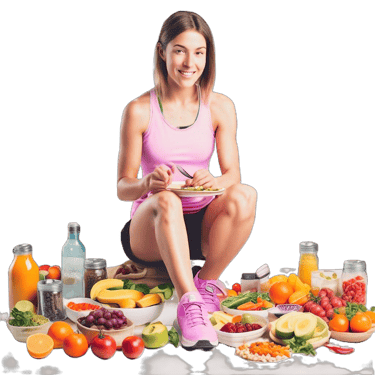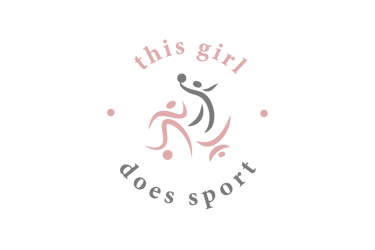Nutrition is a cornerstone of success for teenage girls participating in sports, impacting both their physical and mental well-being. During adolescence, the body is in a crucial phase of growth, developing stronger muscles, bones, and organs, all of which are essential for athletic performance and overall health. Proper nutrition provides the energy needed to excel in sports, recover effectively, and reduce the risk of injuries. Beyond physical benefits, nutrition plays a key role in mental health by supporting hormonal balance, including oestrogen and progesterone, which influence brain function, mood, and focus. Without adequate fueling, teenage athletes may experience diminished performance, impaired growth, and mental fatigue, underscoring the importance of a balanced diet to thrive both on and off the field.
You didn’t come this far to stop


Youth Sport Nutrition are proud to team up with This Girl Does Sport. We believe nutrition plays a vital role supporting normal growth and development, not to mention performance. Partnering with This Girl Does Sport, through products and educational services, we hope to reach more families. Together, championing confidence, inclusion, and strength — on and off the field.
Nutrition - Nutrition - Nutrition....




Youth Sport Nutrition Services
If you're looking for personalised nutrition advice, consider Youth Sport Nutrition nutrition services. We offer professional consultations with qualified sports nutritionists at below-market rates to help you explore the best solutions.
At "this girl does sport" we have a joint mission with YSN to bring the right nutritional support to our girls so please click on this link to get a 10% discount - via the link the discount will automatically apply - https://youthsportnutrition.com/discount/TGDS10
Youth Sport Nutrition NUTRI-TEEN Food Powders -
We’ve created the world’s first food powder shake tailored specifically to active youths. Not only is it a great source of protein, but each shake also contains a specific blend of fats, carbs and 16 essential micronutrients to ensure athletes get everything their body needs to perform and its best. NUTRI-TEEN Shakes are specifically designed to cater to the nutritional needs of active youths, this food powder can help fill in any dietary gaps, providing the high-quality protein that's crucial for muscle recovery and growth.
Available in several kid-approved flavours, these food powder shakes offer a quick, easy, and tasty way to boost your child's protein intake. What sets NUTRI-TEEN shakes apart is their focus on supporting youths during their vital growth and development phases, as well as facilitating recovery.
Please remember, these food powder shakes are not meant to replace a balanced diet of whole foods. Instead, they're designed to complement it, particularly when your child's dietary needs are heightened due to intense training sessions. If ensuring adequate protein through food alone is proving difficult, consider adding YSN NUTRI-TEEN shakes to your young athlete's nutritional plan for that added support.
Click on this link to get a 10% discount - via the link the discount will automatically apply - https://youthsportnutrition.com/discount/TGDS10
Disclaimer: This article is intended to provide general information about nutrition for youth athletes and is not meant to replace professional dietary advice or individual nutritional counselling. Every child's nutritional needs can vary due to factors such as age, size, physical activity level, and medical conditions. We strongly recommend consulting with a registered dietitian or a healthcare provider before making changes to your child's diet, such as adding food powders. YSN and the author of this article do not take responsibility for any possible consequences from any treatment, procedure, dietary modification, action, or application of medication which results from reading or following the information contained in this article.
5 Nutrition Tips for Teenage Female Athletes
Female youth athletes have unique nutrition needs. Not only do they need to fuel their performances in training and competition, but they need to fuel their bodies for normal growth, development and good health too. But knowing exactly what to eat and when can be really confusing for teenage athletes who are often bombarded with a host of misinformation whether that be from social media or school friends. So, to help support our female athletes, we’ve put together a list of 5 top nutrition tips to simplify eating for performance and health.
1. Calories aren’t bad!
The word ‘calorie’ is often associated with negative connotations, referred to in the context of counting or cutting calories or seen as something that should be limited. But calories certainly aren’t something to be feared! Simply put, they’re a measure of energy; both the energy that you eat and the energy that your body uses. Young female athletes will have much higher calorie needs than their non-athletic peers so will need to eat a lot of calories to ensure their bodies get the energy it needs. Under fuelling can be really bad for health and increases the risk of injury and illness, as well as making athletes feel generally exhausted and lethargic too. (Read more about calories here).
2. Carbs are key!
Carbs are another one that get a bad rep. There’s always talk of cutting carbs and low-carb diets. But for young female athletes they’re absolutely crucial to performance and health and need to make up the bulk of most meals. Salads are a great way of getting in those micronutrients you need, but they’re not going to fuel your performance unfortunately! (Read more about carbohydrates here).
3. Protein is for more than just muscles
When we ask youth athletes about protein, the first things they mention are muscles; strength, size, repair, recovery. While these are all completely correct, protein is important for many other reasons and those reasons listed are often why many female athletes are worried about eating protein in the diet. Make sure you eat a good source of protein with each meal, 1-2 high protein snack throughout the day and around 20g after training too. But don’t worry, this won’t magically make you overly muscular! (Read more about protein here).
4. Fats are good
Another hugely misunderstood food group! Fats aren’t all bad, in fact they’re an essential part of a youth athletes’ diet. Plenty of unsaturated fats should be include in the diet for health and recovery purposes. And did you know that omega-3’s may even help to reduce period pains? So, eat plenty of oily fish (or a fish oil supplement) at the start of your period to help reduce cramps.
5. Periods are normal
Periods are still unfortunately considered to be a taboo subject, especially amongst younger female athletes. But there a perfectly normal and even essential part of a female athlete’s life and career. Don’t be scared or embarrassed to talk about your cycle to your coaches, teammates or parents. In fact, tracking it and talking about it are key to good performance.
Your body will undergo various changes throughout your cycle so it’s important to recognise these and match your training demands accordingly. Tracking your cycle is also a great way to spot any irregularities or missed periods that can easily occur due to under fuelling. While this is really common in female athletes, it certainly isn’t normal and is something that needs to be addressed asap.
We know that nutrition can be a minefield, especially for young female athletes, so to help educate female athletes and their parents on good nutrition and how to fuel, we've put together a simple downloadable guide on nutrition for female athletes. Head over to our website here to buy and download.


There are a few common mistakes that we see across sports nutrition. These often come about due to myths or misinterpretation.
1. Not enough protein - Due to strenuous training schedules, it is likely you will require more protein. Protein provides so much more than repairing your muscle tissue after exercising it is fundamental for your enzyme activity, transport proteins, cellular tissue, hormones and skeletal muscle.
We hear lots about protein at the moment but it's really important to get the correct amount of protein in, and from the correct food sources to maximise you’re training potential.
This means getting protein from a range of different foods and supplementing when needing a boost so that it can provide you with all the essential amino acids (amino acids are the building blocks of protein) for optimal health, recovery, muscle function and neurological well-being.
It is important that you get a minimum of 1 g of protein per kg of body weight, with optimal levels reported to be between 1.2 and 1.6g per kg of body weight. See our protein calculator here.
2. Caught up on calories - We all get caught up on the calorie conundrum. A calorie is not a nutrient but purely a unit of energy. Not all nutrients are created equally’ all have differing roles and actions in the body.
For example, 100 g of chips is very different to 100g of broccoli. Neither are bad, but one is richer in fibre, vitamin and minerals (broccoli) and the other (chips) will have a higher calorie content but void of beneficial nutrients; they only become negative when consumed too often as they both have their own attributes, but the key is placement with frequency of consumption.
Many youth athletes and young adults get fixated on calorie intake and this can lead to calorie restriction. As fats have a higher calorie content (than proteins and carbohydrates) they often get removed from the daily diet in the belief that they are going to help change their body weight.
However, fats are absolutely essential for cellular and hormonal processes- which without the metabolism, and neurological well-being cannot occur. Therefore, if you're looking to change your body composition is really important to ensure a balance of macro and micronutrients are consumed, with a few treats added over the week. For more information read the nutritional needs of youth athletes.
3. Poor recovery - Another fundamental mistake is poor recovery nutrition. Hinting on above point regarding protein - it's really important that you get in enough protein in to meet your bodies needs. But also, this means getting enough for carbohydrates to replenish glycogen stores.
Carbohydrates get converted into the body into sugars which the body can use immediately (perfect for training). The carbs that are not used immediately can be stored into the muscle tissue as glycogen.
Of course, too much of this will be stored as body fat but if you're training hard you'll need to replenish glycogen stores daily and it takes about 24 hours to replenish to completely. Glycogen also helps preserve muscle tissue as it ensures that the body is using carbohydrates energy, and not breaking down protein for energy.
If you cannot get this from whole foods post-exercise/training, then you could explore a high-protein fast-acting food powder designed for active youths, like NUTRI-TEEN Food Powder, which provides your body with the exact balance of protein, carbs and fat along with micronutrients for optimal recovery.
4. Getting distracted by social media - It's really hard not to get caught up by what other people are doing or what is being shown on social media. While not everything on social media is wrong or bad, it can be quite hard to differentiate fact from fiction. If something is marketed as being too good to be true it is most likely not going to be beneficial to your training or your health, in the short or long term. Also understanding that a lot of social media have been airbrushed or manipulated to present an ideal and thus not reflect real life.
5. Hydration - And lastly but not least is fluid. We often get caught up with all the different foods and nutrients that we should be in getting in, yet our bodies cannot function without water (or with the small addition of some sugar free squash).
Every single reaction in the body requires water - without good hydration performance time slows, you'll feel tried. One major impact is that dehydration slows down toxin removal in the cells - this means lactic acid builds up quicker, impacting all elements of training and muscle function. Best to sip water little and often throughout the day and during training, even on cold days or if you are swimming when you may not feel so thirsty.
How can Youth Sport Nutrition help? - Youth Sport Nutrition products comprise of whole food ingredients that have been carefully selected to aid young athlete’s needs, taste great and add convenience to a busy schedules. The powdered formulas enable quick solubility in water or milk, to form a delicious nutrient packed shake that your youth athlete can enjoyed pre or post exercise- helping aid recovery and increase energy.
Youth Sport Nutrition always recommend to opt for whole foods first as the rule. Food powders such as NUTRI-TEEN shakes, and Oat energy bars are a nutritious way to top-up on high-quality nutrients to support parents of youth athletes faced with tight schedules.
If you want any help with designing a food-first meal plan, you can speak to our nutrition team today.
Author
Natalie Rouse
First-Class Honours degree in Human Nutrition (BSc Hons), Master of Research in Performance Nutrition and Socio-culture (MRES), Registered and accredited Nutritionist with the Association for Nutrition (ANutri), and Nutritional Consultant and Nutritional Research Scientist (RSci).
Disclaimer: This article is intended to provide general information about nutrition for youth athletes and is not meant to replace professional dietary advice or individual nutritional counselling. Every child's nutritional needs can vary due to factors such as age, size, physical activity level, and medical conditions. We strongly recommend consulting with a registered dietitian or a healthcare provider before making changes to your child's diet, such as adding food powders. YSN and the author of this article do not take responsibility for any possible consequences from any treatment, procedure, dietary modification, action, or application of medication which results from reading or following the information contained in this article.
Nutrition mistakes you're probably making!


Empower
Join us in inspiring girls to play sports.
Active
Community
hello@thisgirldoessport.com
© 2025. All rights reserved. - Powered by "These Girls Do.... "


